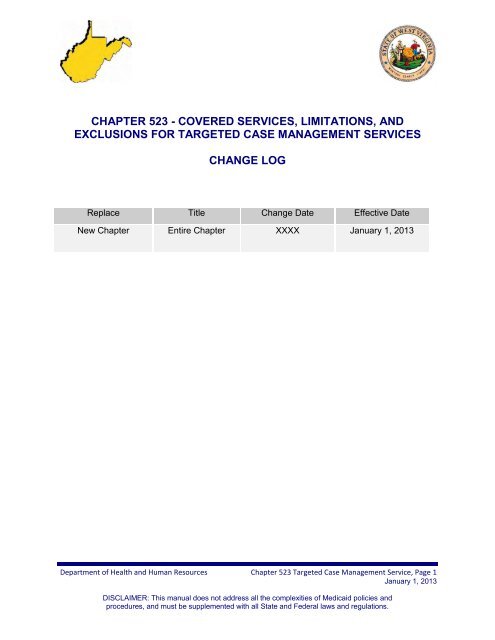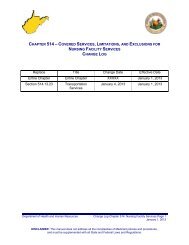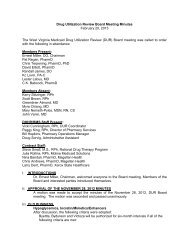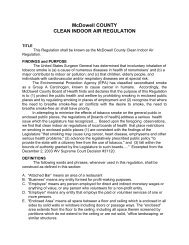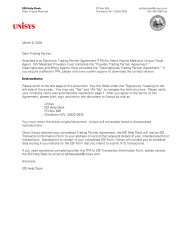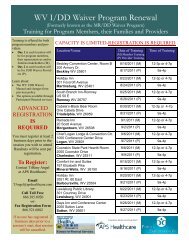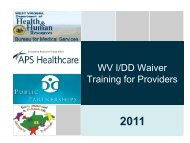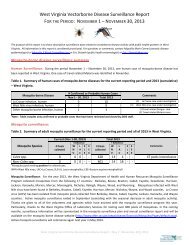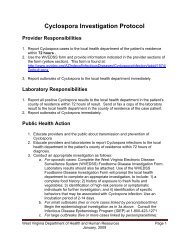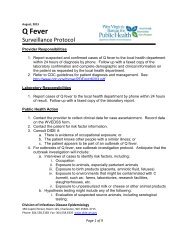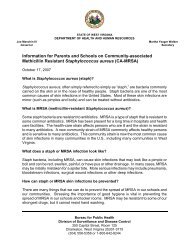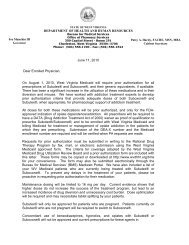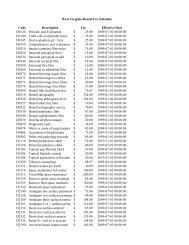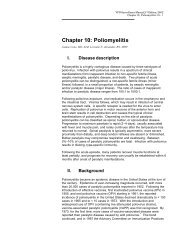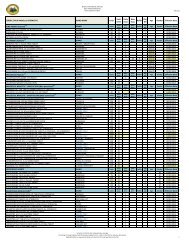chapter 523 - DHHR - State of West Virginia
chapter 523 - DHHR - State of West Virginia
chapter 523 - DHHR - State of West Virginia
You also want an ePaper? Increase the reach of your titles
YUMPU automatically turns print PDFs into web optimized ePapers that Google loves.
CHAPTER <strong>523</strong> - COVERED SERVICES, LIMITATIONS, AND<br />
EXCLUSIONS FOR TARGETED CASE MANAGEMENT SERVICES<br />
CHANGE LOG<br />
Replace Title Change Date Effective Date<br />
New Chapter Entire Chapter XXXX January 1, 2013<br />
Department <strong>of</strong> Health and Human Resources Chapter <strong>523</strong> Targeted Case Management Service, Page 1<br />
January 1, 2013<br />
DISCLAIMER: This manual does not address all the complexities <strong>of</strong> Medicaid policies and<br />
procedures, and must be supplemented with all <strong>State</strong> and Federal laws and regulations.
CHAPTER <strong>523</strong> - COVERED SERVICES, LIMITATIONS, AND<br />
EXCLUSIONS FOR TARGETED CASE MANAGEMENT SERVICE<br />
TABLE OF CONTENTS<br />
TOPIC<br />
PAGE NO.<br />
Introduction ................................................................................................................................. 2<br />
<strong>523</strong>.0 Definitions ..................................................................................................................... 3<br />
<strong>523</strong>.1 Targeted Case Management Service ........................................................................... 3<br />
<strong>523</strong>.1.1 Child Medical Necessity Standards............................................................................... 3<br />
<strong>523</strong>.2 Exclusions (Child): The child does not qualify for TCM ................................................. 4<br />
<strong>523</strong>.3 Adult Medical Necessity Standards (3 Categories) ....................................................... 4<br />
<strong>523</strong>.4 Exclusions: The adult is not eligible for TCM services................................................... 5<br />
<strong>523</strong>.5 Provider Enrollment Requirements ............................................................................... 6<br />
<strong>523</strong>.6 TCM Agency Administration Requirements .................................................................. 6<br />
<strong>523</strong>.7 Criminal and Investigation Background Checks (CIB)................................................... 7<br />
<strong>523</strong>.8 Requirements: Staff Qualifications ................................................................................ 8<br />
<strong>523</strong>.9 Other Administrative Requirements .............................................................................. 9<br />
<strong>523</strong>.10 Method <strong>of</strong> Verifying Bureau for Medical Services’ Requirements ................................ 10<br />
<strong>523</strong>.11 Procedure Code Units, Components, Limits, and Exclusions ...................................... 10<br />
<strong>523</strong>.12 Components <strong>of</strong> Targeted Case Management Services ............................................... 11<br />
<strong>523</strong>.13 Service Limitations ..................................................................................................... 12<br />
<strong>523</strong>.14 Service Exclusions ..................................................................................................... 12<br />
<strong>523</strong>.15 Member Choice <strong>of</strong> Single Targeted Case Management Provider ............................... 12<br />
<strong>523</strong>.16 Documentation and Record Retention Requirements ................................................. 13<br />
<strong>523</strong>.17 Prior Authorization ...................................................................................................... 14<br />
<strong>523</strong>.18 Prior Authorization Procedures ................................................................................... 14<br />
<strong>523</strong>.19 Prior Authorization Requirements ............................................................................... 14<br />
Department <strong>of</strong> Health and Human Resources Chapter <strong>523</strong> Targeted Case Management Service, Page 1<br />
January 1, 2013<br />
DISCLAIMER: This manual does not address all the complexities <strong>of</strong> Medicaid policies and<br />
procedures, and must be supplemented with all <strong>State</strong> and Federal laws and regulations.
CHAPTER <strong>523</strong>–COVERED SERVICES, LIMITATIONS, AND EXCLUSIONS FOR<br />
TARGETED CASE MANAGEMENT SERVICE<br />
INTRODUCTION<br />
The relationship <strong>of</strong> the targeted case manager with a Medicaid member and his or her<br />
family should be one <strong>of</strong> a partnership. As such, members, parents, and families are not<br />
merely spectators <strong>of</strong> case management recommendations, but active participants in care<br />
planning throughout the case management process. This is a necessary perspective in<br />
order for the member’s needs and/or preferences to be considered and addressed<br />
individually and within the environment in which the person resides.<br />
Accordingly, organized strategies that empower members, parents, and families to assume<br />
and carry out their responsibilities must be included in this mutual planning process. It is<br />
very important that a targeted case manager is aware <strong>of</strong> and sensitive to the values,<br />
attitudes, and beliefs that are unique to each family. Values concerning approaches and<br />
styles <strong>of</strong> parenting and/or family life vary according to culture. The effectiveness <strong>of</strong> Targeted<br />
Case Management (TCM) is positively impacted by a demonstrated respect for cultural<br />
variations among families. Thus, it is critical that case managers be able to identify and<br />
understand cultural beliefs, values, attitudes, and morals by which beneficiaries and their<br />
families operate.<br />
TCM effectiveness is further enhanced when integrated with other services and resources<br />
identified through a systems perspective, considering all active participants in the<br />
individual’s life (including the individual’s parents, family, and significant others and any<br />
involved service providers). Interagency collaboration is crucial to ensuring that a member’s<br />
needs are adequately met without duplication <strong>of</strong> services. Thus, it is important for a system<br />
to exist within each agency to ensure that targeted case managers are communicating with<br />
other pr<strong>of</strong>essionals and involved parties, coordinating care and services and meeting the<br />
specific needs <strong>of</strong> each individual and, as appropriate, the needs <strong>of</strong> families.<br />
TCM is the coordination <strong>of</strong> services to ensure that eligible Medicaid members have access<br />
to a full array <strong>of</strong> needed services including the appropriate medical, educational, or other<br />
services. TCM is responsible for identifying individual problems, needs, strengths, and<br />
resources; coordinating services necessary to meet those needs; and monitoring the<br />
provision <strong>of</strong> necessary and appropriate services. This process is intended to assist<br />
beneficiaries and as appropriate, their families, in accessing services which are supportive,<br />
effective and cost efficient. TCM activities ensure that the changing needs <strong>of</strong> the Medicaid<br />
beneficiary are addressed on an ongoing basis and that appropriate choices are provided<br />
from the widest array <strong>of</strong> options for meeting those needs.<br />
Department <strong>of</strong> Health and Human Resources Chapter <strong>523</strong> Targeted Case Management Service, Page 2<br />
January 1, 2013<br />
DISCLAIMER: This manual does not address all the complexities <strong>of</strong> Medicaid policies and<br />
procedures, and must be supplemented with all <strong>State</strong> and Federal laws and regulations.
This <strong>chapter</strong> sets forth the Bureau for Medical Services’ requirements for payment <strong>of</strong><br />
Targeted Case Management Services for persons with mental illness, developmental<br />
disabilities, substance-related disorders, and/or victims <strong>of</strong> domestic violence; rendered by<br />
qualified providers to eligible <strong>West</strong> <strong>Virginia</strong> Medicaid members.<br />
<strong>523</strong>.0 DEFINITIONS<br />
Direct Service – a service that is designed to support the individual in his or her communitybased<br />
setting. A direct service is not designed to change behavior or emotional functioning.<br />
Designated Legal Representative (DLR) – Parent <strong>of</strong> a minor child, conservator, legal<br />
guardian (full or limited), health care surrogate, medical power <strong>of</strong> attorney, power <strong>of</strong><br />
attorney, representative payee, or other individual authorized to make certain decisions on<br />
behalf <strong>of</strong> a consumer and operating within the scope <strong>of</strong> his/her authority.<br />
Credentialing – an individual approved to provide Targeted Case Management Services by<br />
the agency’s working committee composed <strong>of</strong> experienced licensed and/or certified staff<br />
representative <strong>of</strong> the appropriate disciplines or practitioners. A provider agency with few<br />
clinical staff may designate a credentialing <strong>of</strong>ficer.<br />
Internal Curriculum - The training protocol developed and approved by the agency for staff<br />
providing Targeted Case Management services.<br />
Service Plan - A written description <strong>of</strong> the behavioral health services and/or supports that<br />
the consumer is to receive. A Service Plan may be otherwise named a “Plan <strong>of</strong> Service,”<br />
“Treatment Plan” or other appropriate title.<br />
<strong>523</strong>.1 TARGETED CASE MANAGEMENT SERVICE<br />
Targeted Case Management Services are federally defined as "those services which assist<br />
Medicaid eligible recipients in the target group to gain access to needed medical, behavioral<br />
health, social, educational and other services.” Targeted Case Management is not a<br />
direct service.<br />
<strong>523</strong>.1.1 Child Medical Necessity Standards<br />
(Must meet one <strong>of</strong> the two categories below):<br />
1. Documentation indicates that a child member is eligible for TCM because:<br />
a. The child is between the ages <strong>of</strong> 3 through 17, and<br />
b. The child demonstrates a serious and persistent emotional, behavioral,<br />
Department <strong>of</strong> Health and Human Resources Chapter <strong>523</strong> Targeted Case Management Service, Page 3<br />
January 1, 2013<br />
DISCLAIMER: This manual does not address all the complexities <strong>of</strong> Medicaid policies and<br />
procedures, and must be supplemented with all <strong>State</strong> and Federal laws and regulations.
developmental and/or substance abuse or dependence disturbance as<br />
exemplified by a valid and documented Axis I diagnosis and/or diagnosis <strong>of</strong><br />
developmental disability as described in the language <strong>of</strong> the current<br />
Diagnostic and Statistical Manual <strong>of</strong> the American Psychiatric Association;<br />
and<br />
c. The Designated Legal Representative or older child member is documented<br />
to be unable to access/provide the service proposed without training or<br />
support; and<br />
d. By virtue <strong>of</strong> age and effects <strong>of</strong> the emotional and/or developmental<br />
impairments, the child is unable to perform age-appropriate activities <strong>of</strong> daily<br />
living (ADL) without assistance and/or prompting.<br />
OR<br />
2. Documentation indicates that the Child is eligible due to actual or pending<br />
removal from placement and:<br />
a. The child is between the ages <strong>of</strong> 3 and 17 inclusively and/or is in the custody<br />
<strong>of</strong> the <strong>DHHR</strong> and;<br />
b. The child is removed or is pending removal from placement due to allegations<br />
<strong>of</strong> abuse and neglect; and<br />
c. The appointed foster care entity is not able or qualified to perform the case<br />
management task in question.<br />
<strong>523</strong>.2 Exclusions (Child): The child does not qualify for TCM if:<br />
1. The child is currently eligible for case management services through the <strong>West</strong><br />
<strong>Virginia</strong> Birth to Three Program, or is in a residential treatment facility, or is in a<br />
Psychiatric Residential Treatment Facility (PRTF), or Long-Term Care, or is<br />
receiving acute psychiatric care, and/or is enrolled through the I/DD Waiver program,<br />
or is residing in an ICF/MR. provided that the community-based provider may supply<br />
discharge planning services through Targeted Case Management for eligible<br />
children 10 days prior to discharge from acute psychiatric care and 30 days prior to<br />
discharge from a long- term care program.<br />
2. The child is receiving TCM services from another entity including a county school<br />
system.<br />
<strong>523</strong>.3 Adult Medical Necessity Standards (3 categories)<br />
1. Documentation indicates that an adult member is eligible for TCM because:<br />
a. The adult is age 18 or older;<br />
Department <strong>of</strong> Health and Human Resources Chapter <strong>523</strong> Targeted Case Management Service, Page 4<br />
January 1, 2013<br />
DISCLAIMER: This manual does not address all the complexities <strong>of</strong> Medicaid policies and<br />
procedures, and must be supplemented with all <strong>State</strong> and Federal laws and regulations.
. The adult demonstrates a serious and persistent emotional, behavioral,<br />
developmental and/or substance abuse or dependence disturbance as<br />
exemplified by a valid and documented Axis I diagnosis and/or diagnosis <strong>of</strong><br />
developmental disability as described in the language <strong>of</strong> the current<br />
Diagnostic and Statistical Manual <strong>of</strong> the American Psychiatric Association;<br />
c. By virtue <strong>of</strong> age and effects <strong>of</strong> the emotional and/or developmental<br />
impairments, the adult is unable to perform age-appropriate activities <strong>of</strong> daily<br />
living (ADL) without assistance and/or prompting; and<br />
d. The Designated Legal Representative or spouse is documented to be unable<br />
to provide the service proposed without training or support.<br />
OR<br />
2. Documentation indicates that the adult is approved for but pending initiation<br />
<strong>of</strong> I/DD Waiver Services. The adult is determined to be eligible to receive services<br />
through the I/DD Community-Based Waiver Program however is not yet receiving<br />
services.<br />
OR<br />
3. Documentation indicates that the adult is currently and temporarily residing in<br />
a licensed domestic violence shelter.<br />
<strong>523</strong>.4 Exclusions: The adult is not eligible for TCM services if:<br />
1. The adult is currently receiving services through an acute psychiatric care facility; a<br />
state-operated psychiatric facility; or a long-term care facility; is enrolled through the<br />
I/DD Waiver program; or is an active recipient <strong>of</strong> Assertive Community Treatment<br />
(ACT); Provided that the community-based provider may supply discharge planning<br />
services through Targeted Case Management for eligible individuals 10 days prior to<br />
discharge from acute psychiatric care and 30 days prior to discharge from a longer<br />
term care program.<br />
2. The adult is receiving TCM services from another entity.<br />
In order to demonstrate the linkage between emotional/behavioral/developmental<br />
disability and functional impairment, the provider’s documentation must reflect one<br />
or both <strong>of</strong> the following:<br />
1. Because <strong>of</strong> inability to process and comprehend information, the individual is unable<br />
to properly act upon documents or utilize processes regarding benefit eligibility,<br />
medication management, budgeting, or otherwise performing activities required to<br />
continue to live in a community based setting;<br />
Department <strong>of</strong> Health and Human Resources Chapter <strong>523</strong> Targeted Case Management Service, Page 5<br />
January 1, 2013<br />
DISCLAIMER: This manual does not address all the complexities <strong>of</strong> Medicaid policies and<br />
procedures, and must be supplemented with all <strong>State</strong> and Federal laws and regulations.
2. Because <strong>of</strong> interpersonal problems or psychiatric symptomatology, the individual is<br />
unable to cooperate with others in order to achieve goals and obtain services<br />
necessary for community living.<br />
<strong>523</strong>.5 PROVIDER ENROLLMENT REQUIREMENTS<br />
In order to participate in the <strong>West</strong> <strong>Virginia</strong> Medicaid Program and receive payment from<br />
BMS, each provider <strong>of</strong> Targeted Case Management Services must meet all enrollment<br />
criteria as described in Chapter 300 Provider Participation and:<br />
• Meet and maintain all BMS enrollment, certification, and service provision requirements as<br />
described in this manual<br />
• Have a current, valid TCM provider agreement on file<br />
• Be licensed under the laws <strong>of</strong> the <strong>State</strong> <strong>of</strong> <strong>West</strong> <strong>Virginia</strong> as a Behavioral Health Agency;<br />
unless the provider is a domestic violence center. Based on the 1989 Domestic Violence<br />
Act, an agency (domestic violence center) must be licensed as a domestic violence center<br />
under Chapter 48, Article 2C <strong>of</strong> the <strong>West</strong> <strong>Virginia</strong> Code.<br />
<strong>523</strong>.6 TCM AGENCY ADMINISTRATION REQUIREMENTS<br />
• Targeted Case Management agencies must promote effective operation <strong>of</strong> the various<br />
programs and agencies in a manner consistent with applicable <strong>State</strong> laws, regulations,<br />
and procedures. There must be clear policy guidelines for decision making, program<br />
operations, and provision for monitoring the same.<br />
• Targeted Case Management providers must have:<br />
− Provisions for orientation, continuing education, and on-going communication with all<br />
applicable governing boards<br />
− Policies and procedures to protect the rights <strong>of</strong> members<br />
− A comprehensive set <strong>of</strong> personnel policies and procedures<br />
− Job descriptions and qualifications, including licensure, for all staff employed either<br />
directly or by contract with the provider or with an agency contracting with the provider<br />
or program<br />
− Provisions for ensuring staff or contractors possess the skills, attitudes, and knowledge<br />
needed to perform job functions, and provisions for performing regular staff evaluations.<br />
− Written definitions and procedures for use <strong>of</strong> all volunteers must be maintained.<br />
Department <strong>of</strong> Health and Human Resources Chapter <strong>523</strong> Targeted Case Management Service, Page 6<br />
January 1, 2013<br />
DISCLAIMER: This manual does not address all the complexities <strong>of</strong> Medicaid policies and<br />
procedures, and must be supplemented with all <strong>State</strong> and Federal laws and regulations.
• Targeted Case Management providers must exhibit effective inter-agency coordination<br />
that demonstrates a working knowledge <strong>of</strong> other community agencies. This means the<br />
provider and its contracting agencies must be aware <strong>of</strong> the specific program goals <strong>of</strong> other<br />
human service agencies, and maintain current information regarding the types <strong>of</strong> services<br />
<strong>of</strong>fered and limitations on these services. Similarly, providers must ensure that other<br />
human service agencies are provided with accurate, up-to-date information regarding the<br />
provider's services, service limitations, and priorities within those services.<br />
<strong>523</strong>.7 Criminal and Investigation Background Checks (CIB)<br />
A CIB must be initially conducted by the <strong>West</strong> <strong>Virginia</strong> <strong>State</strong> Police for all staff rendering<br />
TCM. Prior to providing any TCM, prospective employees must have a CIB conducted by<br />
the <strong>West</strong> <strong>Virginia</strong> <strong>State</strong> Police. If a CIB request has been sent to the <strong>West</strong> <strong>Virginia</strong> <strong>State</strong><br />
Police, TCM providers may do a preliminary check utilizing on-line internet companies and<br />
use these results until results from the <strong>West</strong> <strong>Virginia</strong> <strong>State</strong> Police are received. An<br />
individual who is providing services or is employed by a provider cannot be considered to<br />
provide services nor can be employed if ever convicted <strong>of</strong>:<br />
1) Abduction<br />
2) Any violent felony crime including but not limited to rape, sexual assault,<br />
homicide, felonious physical assault or felonious battery<br />
3) Any type <strong>of</strong> felony battery<br />
4) Child/adult abuse or neglect<br />
5) Crimes which involve the exploitation <strong>of</strong> a child or an incapacitated adult,<br />
including financial exploitation<br />
6) Felony arson<br />
7) Felony or misdemeanor crime against a child or incapacitated adult which causes<br />
harm<br />
8) Felony drug related <strong>of</strong>fenses within the last 10 years<br />
9) Felony DUI within the last 10 years<br />
10) Hate crimes<br />
11) Kidnapping<br />
12) Murder/ homicide<br />
13) Neglect or abuse by a caregiver<br />
14) Pornography crimes involving children or incapacitated adults including, but not<br />
limited to, use <strong>of</strong> minors in filming sexually explicit conduct, distribution and<br />
exhibition <strong>of</strong> material depicting minors in sexually explicit conduct or sending,<br />
distributing, exhibiting, possessing, displaying or transporting material by a<br />
parent, guardian or custodian depicting a child engaged in sexually explicit<br />
conduct<br />
15) Purchase or sale <strong>of</strong> a child<br />
16) Sexual <strong>of</strong>fenses including, but not limited to incest, sexual abuse, or indecent<br />
exposure<br />
Department <strong>of</strong> Health and Human Resources Chapter <strong>523</strong> Targeted Case Management Service, Page 7<br />
January 1, 2013<br />
DISCLAIMER: This manual does not address all the complexities <strong>of</strong> Medicaid policies and<br />
procedures, and must be supplemented with all <strong>State</strong> and Federal laws and regulations.
17) Healthcare fraud<br />
18) Felony forgery<br />
The OIG Medicaid Exclusion List must be checked for every agency employee who<br />
provides Medicaid services prior to employment. Persons on the OIG Medicaid Exclusion<br />
List cannot provide Medicaid services. This list can be obtained at<br />
http://exclusions.oig.hhs.gov. An individual who has direct contact with a member cannot<br />
continue to be employed if the check discloses previous substantiated child or adult<br />
maltreatment by the individual<br />
Results which include a history <strong>of</strong> Medicaid fraud or abuse or which may place members at<br />
risk <strong>of</strong> personal health and safety must be taken into consideration prior to employment.<br />
If aware <strong>of</strong> a recent conviction or change in status, appropriate action must be taken and<br />
BMS notified about the change.<br />
All payments will be recovered by BMS for services provided by staff:<br />
1) Without a valid CIB in their personnel record,<br />
2) Convicted <strong>of</strong> any <strong>of</strong> the crimes listed above, or<br />
3) Excluded by the <strong>State</strong> or Federal government.<br />
<strong>523</strong>.8 REQUIREMENTS: STAFF QUALIFICATIONS<br />
Targeted Case Management providers must assure that all staff that provides Targeted<br />
Case Management Services to members possesses one <strong>of</strong> the following qualifications:<br />
− A psychologist with a Masters’ or Doctoral degree from an accredited program<br />
− A licensed social worker<br />
− A licensed registered nurse<br />
− A Masters’ or Bachelors’ degree granted by an accredited college or university in one <strong>of</strong><br />
the following human services fields:<br />
<br />
<br />
<br />
<br />
<br />
<br />
<br />
<br />
Psychology<br />
Criminal Justice<br />
Board <strong>of</strong> Regents with health specialization<br />
Recreational Therapy<br />
Political Science<br />
Nursing<br />
Sociology<br />
Social Work<br />
Department <strong>of</strong> Health and Human Resources Chapter <strong>523</strong> Targeted Case Management Service, Page 8<br />
January 1, 2013<br />
DISCLAIMER: This manual does not address all the complexities <strong>of</strong> Medicaid policies and<br />
procedures, and must be supplemented with all <strong>State</strong> and Federal laws and regulations.
Counseling<br />
Teacher Education<br />
Behavioral Health<br />
Liberal Arts or;<br />
Other Degrees approved by the <strong>West</strong> <strong>Virginia</strong> Board <strong>of</strong> Social Work.<br />
− Previous certification on the basis <strong>of</strong> training and experience by the Bureau <strong>of</strong> Behavioral<br />
Health and Health Facilities.<br />
Providers must maintain documentation <strong>of</strong> staff qualifications in staff personnel files.<br />
Documented evidence includes, but is not limited to: transcripts, licenses, and certificates.<br />
• Targeted Case Management providers must have a review process to ensure that<br />
employees providing Targeted Case Management Services possess the minimum<br />
qualifications outlined above. The review process must occur upon hiring <strong>of</strong> new<br />
employees and on an annual basis to assure that credentials remain valid.<br />
• Targeted Case Management providers must plan annual staff development and continuing<br />
education activities for its employees and contractors that broaden their existing<br />
knowledge in the field <strong>of</strong> mental health, substance abuse, and/or developmental<br />
disabilities and related areas.<br />
• Targeted Case Management providers must credential their staff by an internal curriculum<br />
specific to Targeted Case Management prior to the staff assuming their Targeted Case<br />
Management duties.<br />
• Staff development and continuing education activities must be related to program goals<br />
and may include supporting staff by attendance at conferences, university courses, visits<br />
to other agencies, use <strong>of</strong> consultants, and educational presentations within the agency.<br />
Documentation <strong>of</strong> staff continuing education, staff development, and Targeted Case<br />
Management Training must be maintained in staff personnel files.<br />
<strong>523</strong>.9 OTHER ADMINISTRATIVE REQUIREMENTS<br />
• The provider must assure implementation <strong>of</strong> BMS’ policies and procedures pertaining to<br />
service planning and documentation and case record review. Case records should be<br />
arranged so information can be found quickly and easily. Uniform guidelines for case<br />
record organization should be used by staff, so similar information will be found in the<br />
same place from case record to case record. Copies <strong>of</strong> completed release <strong>of</strong> information<br />
forms and consent forms must be filed in the case record.<br />
• Records must contain completed member identifying information. The member's individual<br />
plan <strong>of</strong> service must contain service goals and objectives which are derived from a<br />
Department <strong>of</strong> Health and Human Resources Chapter <strong>523</strong> Targeted Case Management Service, Page 9<br />
January 1, 2013<br />
DISCLAIMER: This manual does not address all the complexities <strong>of</strong> Medicaid policies and<br />
procedures, and must be supplemented with all <strong>State</strong> and Federal laws and regulations.
comprehensive member assessment, and must stipulate the planned service activities<br />
and how they will assist in goal attainment. Termination reports must be filed upon case<br />
closure. There should be on-going case record reviews to ensure that records contain<br />
current, accurate, and complete information.<br />
<strong>523</strong>.10 METHOD OF VERIFYING BUREAU FOR MEDICAL SERVICES’<br />
REQUIREMENTS<br />
Administrative requirements, as well as provision <strong>of</strong> services, are subject to review by BMS<br />
and/or its contracted agents. Bureau for Medical Services’ contracted agents may<br />
promulgate and update utilization management guidelines that have been reviewed and<br />
approved by BMS.<br />
These approved guidelines function as policy. Additional information governing the<br />
surveillance and utilization control program may be found in Chapter 800 – Quality and<br />
Program Integrity.<br />
<strong>523</strong>.11 PROCEDURE CODE UNITS, COMPONENTS, LIMITS, AND EXCLUSIONS<br />
PROCEDURE CODE: T1017<br />
SERVICE UNITS: 15 minutes<br />
SERVICE LIMITS: All units must be prior authorized by APS Healthcare, Inc.<br />
PRIOR AUTHORIZATION: Yes<br />
If, between regular service planning sessions, the member requires access to a service not<br />
previously mentioned on the case management section <strong>of</strong> his/her service plan, both the<br />
member (or their legal guardian) and their case manager must agree and attach an<br />
addendum addressing the needed service to the plan.<br />
For continued eligibility for TCM services, a Medicaid member must meet face to face with<br />
an individual providing a Behavioral Health service to them every 30 days. The<br />
documentation <strong>of</strong> such contact must be completed by the targeted case manager or an<br />
individual with the minimum <strong>of</strong> a bachelor’s degree such as a physician, nurse practitioner,<br />
physician’s assistant, therapist, counselor, or case manager. The Bachelor’s degree must<br />
be in one <strong>of</strong> the eligible areas described under the section entitled “Staff Qualifications.”<br />
The case manager must have at least one face-to-face contact for a valid Targeted Case<br />
Management activity with the member every 90 days. Any TCM service may be conducted<br />
via Tele-medicine with the exception <strong>of</strong> the 90 day Face to Face encounter with the<br />
Targeted Case Manager.<br />
Department <strong>of</strong> Health and Human Resources Chapter <strong>523</strong> Targeted Case Management Service, Page 10<br />
January 1, 2013<br />
DISCLAIMER: This manual does not address all the complexities <strong>of</strong> Medicaid policies and<br />
procedures, and must be supplemented with all <strong>State</strong> and Federal laws and regulations.
<strong>523</strong>.12 COMPONENTS OF TARGETED CASE MANAGEMENT SERVICES<br />
Within Targeted Case Management are a number <strong>of</strong> activities federally recognized as<br />
components <strong>of</strong> case management. These components are:<br />
<br />
<br />
Assessment:<br />
The case manager ensures an on-going formal and informal process to collect and<br />
interpret information about a member's strengths, needs, resources, and life goals.<br />
This process is to be used in the development <strong>of</strong> an individualized service plan.<br />
Assessment is a collaborative process between the member, his/her family, and the<br />
case manager.<br />
Service Planning:<br />
The case manager ensures and facilitates the development <strong>of</strong> a comprehensive,<br />
individualized service plan. The service plan records the full range <strong>of</strong> services,<br />
treatment, and/or other support needs necessary to meet the member’s goals. The<br />
case manager is responsible for regular service planning reviews based on the<br />
member’s needs at regularly scheduled intervals. (Note: When the case manager<br />
participates in a treatment team meeting, the services provided are not billable as<br />
Targeted Case Management.)<br />
Linkage/Referral:<br />
Case managers ensure linkage to all internal and external services and supports<br />
identified in the member’s service plan.<br />
Advocacy:<br />
Targeted Case Management advocacy refers to the actions undertaken on behalf <strong>of</strong><br />
the member in order to ensure continuity <strong>of</strong> services, system flexibility, integrated<br />
services, proper utilization <strong>of</strong> facilities, and resources, and accessibility to services.<br />
This includes assuring that the member's legal and human rights are protected.<br />
Crisis Response Planning:<br />
The case manager must ensure that adequate and appropriate crisis response<br />
procedures are available to the member and identified in the individual service plan.<br />
The case manager assists the member as necessary in accessing crisis support<br />
services and interventions.<br />
Service Plan Evaluation:<br />
The case manager continually evaluates the appropriateness <strong>of</strong> the member's<br />
service plan and makes appropriate modifications, establish new linkages, or<br />
engage in other dispositions as necessary, up to and including discharge planning<br />
as appropriate.<br />
Department <strong>of</strong> Health and Human Resources Chapter <strong>523</strong> Targeted Case Management Service, Page 11<br />
January 1, 2013<br />
DISCLAIMER: This manual does not address all the complexities <strong>of</strong> Medicaid policies and<br />
procedures, and must be supplemented with all <strong>State</strong> and Federal laws and regulations.
Monitoring and Follow-up:<br />
The Case Manager ensures appropriate quality, quantity and effectiveness <strong>of</strong><br />
service in accordance with the Service Plan. The Case Manager may only utilize<br />
and bill for this component when one <strong>of</strong> the above stated components have been<br />
utilized and determined to be a valid TCM activity. The amount <strong>of</strong> time spent to<br />
“monitor/follow-up” a TCM service shall not exceed the amount <strong>of</strong> time spent<br />
rendering the valid activity.<br />
Note: These components do not constitute separate services and cannot be billed as<br />
separate services, but are identified and defined here to assist case managers in<br />
understanding their roles and responsibilities.<br />
<strong>523</strong>.13 SERVICE LIMITATIONS<br />
General Service limitations governing the provision <strong>of</strong> all <strong>West</strong> <strong>Virginia</strong> Medicaid services<br />
will apply pursuant to Chapter 300, Provider Participation <strong>of</strong> the Provider Manual. In addition<br />
to the requirements for payment <strong>of</strong> services described in this <strong>chapter</strong>, Targeted Case<br />
Management Services will not be authorized prior to a member's discharge from an<br />
Intermediate Care Facility/Mental Retardation (ICF/MR) or an inpatient psychiatric facility<br />
except for those provided within 30 days prior to discharge as part <strong>of</strong> the discharge process.<br />
<strong>523</strong>.14 SERVICE EXCLUSIONS<br />
In addition to the exclusions listed in Chapter 100, General Information <strong>of</strong> the Provider<br />
Manual, members who receive case management services under the Home and<br />
Community-Based Services Waivers granted under Section 1915(c) <strong>of</strong> the Social Security<br />
Act are excluded from receiving Targeted Case Management reimbursement through this<br />
service option.<br />
Payment for Targeted Case Management Services must not duplicate payments made to<br />
other entities for case management/service coordination services.<br />
<strong>523</strong>.15 MEMBER CHOICE OF SINGLE TARGETED CASE MANAGEMENT<br />
PROVIDER<br />
Each member or their legal guardian must be provided information, by the provider with<br />
whom they are seeking services, about the availability <strong>of</strong> all Medicaid-enrolled providers<br />
rendering Targeted Case Management services.<br />
The member must be given an opportunity to choose only one approved Targeted Case<br />
Management provider and must indicate this choice on BMS-approved “Medicaid Targeted<br />
Case Management Client Enrollment” form.<br />
Department <strong>of</strong> Health and Human Resources Chapter <strong>523</strong> Targeted Case Management Service, Page 12<br />
January 1, 2013<br />
DISCLAIMER: This manual does not address all the complexities <strong>of</strong> Medicaid policies and<br />
procedures, and must be supplemented with all <strong>State</strong> and Federal laws and regulations.
A signed copy <strong>of</strong> the “Medicaid Targeted Case Management Client Enrollment” form must<br />
be retained in the member’s record and must serve as an enrollment, disenrollment, or reenrollment<br />
<strong>of</strong> the member with the provider.<br />
The Bureau for Medical Services reimburses only for Targeted Case Management Services<br />
provided by the Medicaid-enrolled provider chosen by the member.<br />
A member may choose a new Targeted Case Management provider at any time. The<br />
effective date <strong>of</strong> the change <strong>of</strong> providers will be the first day <strong>of</strong> the month following the<br />
change.<br />
<strong>523</strong>.16 DOCUMENTATION AND RECORD RETENTION REQUIREMENTS<br />
Targeted Case Management providers must comply with the documentation and<br />
maintenance <strong>of</strong> records requirements described in Chapter 100, General Information and<br />
Chapter 300, Provider Participation, <strong>of</strong> the BMS Provider Manual. In addition to the<br />
documentation requirements described in this <strong>chapter</strong>, the following requirements also<br />
apply to payment <strong>of</strong> Targeted Case Management Services:<br />
A Medicaid-enrolled provider <strong>of</strong> Targeted Case Management Services must maintain the<br />
following information/documentation:<br />
<br />
<br />
<br />
<br />
An individual permanent clinical record for each member receiving Targeted Case<br />
Management Services.<br />
Evidence in each clinical record that the member is shown to be in a targeted<br />
population as defined in Section <strong>523</strong>.1 or <strong>523</strong>.3.<br />
An individualized service plan detailing the need for Targeted Case Management<br />
Services which is updated at 90-day intervals or more frequently if indicated by<br />
member need.<br />
A clinical record that must include documentation specific to services/activities<br />
reimbursed as Medicaid Targeted Case Management. This includes a specific note<br />
for each individual case management service/activity provided and billed.<br />
Each case note must:<br />
− Be dated and signed by the case manager along with a listing <strong>of</strong> the case manager’s<br />
credentials, e.g. LSW, MA;<br />
− Have relevance to a goal or objective in the individual’s plan <strong>of</strong> service;<br />
Department <strong>of</strong> Health and Human Resources Chapter <strong>523</strong> Targeted Case Management Service, Page 13<br />
January 1, 2013<br />
DISCLAIMER: This manual does not address all the complexities <strong>of</strong> Medicaid policies and<br />
procedures, and must be supplemented with all <strong>State</strong> and Federal laws and regulations.
− Include the purpose and content <strong>of</strong> the activity as well as the outcome achieved;<br />
Include a description <strong>of</strong> the type <strong>of</strong> contact provided (e.g., face-to-face,<br />
correspondence, telephone contacts);<br />
− Detail the TCM component <strong>of</strong> the valid activity provided; (i.e., assessment, service<br />
planning, linkage/referral, advocacy, crisis response planning, service plan<br />
evaluation and monitoring/follow-up);<br />
− List the location the activity occurred; and<br />
− List the actual time spent providing each activity by itemizing the start - and - stop<br />
time.<br />
A Targeted Case Management unit <strong>of</strong> service consists <strong>of</strong> a 15-minute period <strong>of</strong> time. Claims<br />
must not be processed for less than a full unit <strong>of</strong> service. Consequently, in filing claims for<br />
Medicaid reimbursement, the amount <strong>of</strong> time documented in minutes must be totaled and<br />
divided by 15. Partial units must be rounded down to arrive at the number <strong>of</strong> units billed.<br />
After arriving at the number <strong>of</strong> billable units, the last date <strong>of</strong> service provision must be billed<br />
as the date <strong>of</strong> service. The billing period cannot overlap calendar months.<br />
The documentation must demonstrate that only one staff person's time is billed for any<br />
specific activity provided to the member.<br />
<strong>523</strong>.17 PRIOR AUTHORIZATION<br />
Prior authorization requirements governing the provision <strong>of</strong> Targeted Case Management<br />
Services will apply pursuant to the following limitations.<br />
<strong>523</strong>.18 PRIOR AUTHORIZATION PROCEDURES<br />
BMS requires that providers prior authorize all Targeted Case Management Services with<br />
BMS’s contracted agent. Refer to the BMS website<br />
http://www.dhhr.wv.gov/bms/Pages/default.aspx regarding information on the BMS<br />
Utilization Management Contractor.<br />
General information on prior authorization requirements for Targeted Case Management<br />
Services and contact information for submitting a request may be obtained by contacting<br />
BMS’ contracted agent.<br />
<strong>523</strong>.19 PRIOR AUTHORIZATION REQUIREMENTS<br />
Department <strong>of</strong> Health and Human Resources Chapter <strong>523</strong> Targeted Case Management Service, Page 14<br />
January 1, 2013<br />
DISCLAIMER: This manual does not address all the complexities <strong>of</strong> Medicaid policies and<br />
procedures, and must be supplemented with all <strong>State</strong> and Federal laws and regulations.
• Prior authorization requests for Targeted Case Management Services must be submitted<br />
within the timelines required by BMS’ contracted agent.<br />
• Prior authorization requests must be submitted in a manner specified by BMS’ contracted<br />
agent.<br />
Department <strong>of</strong> Health and Human Resources Chapter <strong>523</strong> Targeted Case Management Service, Page 15<br />
January 1, 2013<br />
DISCLAIMER: This manual does not address all the complexities <strong>of</strong> Medicaid policies and<br />
procedures, and must be supplemented with all <strong>State</strong> and Federal laws and regulations.


